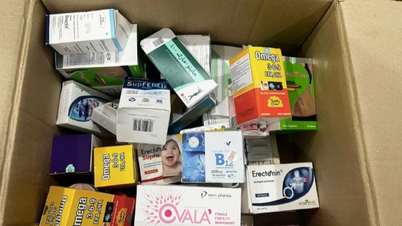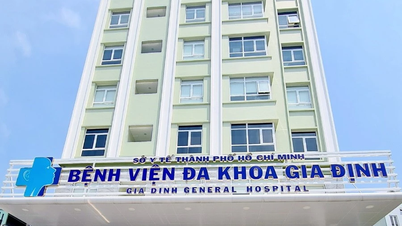The hospital can decide on the form, process, and procedures for selecting contractors when purchasing drugs not included in the health insurance payment list.
According to the Ministry of Health , this is a new point in the draft revised Law on Bidding. This content aims to help doctors and patients increase their access and choice of treatment drugs, especially for patients who voluntarily pay. Previously, hospitals purchased drugs through a centralized bidding mechanism or a separate bidding mechanism if permitted.
In addition, the revised Law on Bidding may allow price negotiation and the use of multiple contractor lists so that hospitals can be proactive in procurement.
This law is being consulted at the meeting of the National Assembly 's specialized committees, and is expected to be passed at the 5th session of the 15th National Assembly, which opens on May 22. Currently, 95% of hospital beds are in public hospitals. Therefore, removing institutional bottlenecks in drug procurement management, especially new drugs and generic drugs, will help increase patients' access to new drugs and advanced treatment methods for doctors.
According to the Ministry of Health, the price of generic drugs in Vietnam is low compared to other countries in the ASEAN region (for most major treatment groups). The rate of use of generic drugs in Vietnamese medical facilities is 11%, while the average rate in Asia-Pacific countries is more than 27%.
Data from the IQVIA MIDAS Medical Research Organization updated in the first quarter of 2022 shows that Vietnamese patients are actually disadvantaged in accessing new drugs compared to other countries in the region. Specifically, in 2022, only 9% of new drugs will be available in Vietnam (out of a total of 460 new drugs launched from 2012 to the end of 2021).
Dr. Nguyen Trong The, Deputy Head of the Department of Respiratory Infectious Diseases and Resuscitation, 108 Central Military Hospital, said that when treating patients, doctors always prioritize choosing the most suitable drugs for the patient. In severe and critical cases, priority is given to using drugs that are effective immediately.
"Diversifying the choice of drugs we use is also extremely important because the same disease has many different levels," said Dr. The.
Recently, many hospitals have faced a crisis due to problems with procurement regulations. To solve this problem, the Government has allowed hospitals to pilot a number of new procurement mechanisms through Resolution 30 and Decree 07. Hospital leaders said that as soon as the problems were solved, hospitals accelerated the bidding and procurement process. However, hospitals have requested that the Bidding Law be amended soon.
Like the Central Hospital of Odonto-Stomatology or Bach Mai Hospital, the leaders said that after the Government removed the obstacles, 90-95% of the hospital's concerns were resolved. Hospitals are urgently inviting bids and making purchases to resolve the immediate situation. "However, the hospital proposes to soon amend the Law on Bidding to serve the hospital's long-term medical examination and treatment work," said Associate Professor, Dr. Tran Cao Binh, Director of the Central Hospital of Odonto-Stomatology.
In mid-March, Deputy Minister of Health Do Xuan Tuyen said that the difficulties in the industry cannot be completely resolved immediately, and many laws such as Price, Bidding, and Pharmacy need to be amended to be consistent after the Government has removed obstacles.
"The Ministry of Health is closely coordinating with the Ministry of Finance and the Ministry of Planning and Investment to amend the Law on Prices and the Law on Bidding. If all documents are not agreed upon, the problems cannot be resolved," Deputy Minister Tuyen said when guiding health departments, hospitals, and businesses nationwide to implement the Government's decrees and resolutions to remove obstacles.
Experts believe that if the laws are synchronized, institutional bottlenecks in drug procurement management can be gradually removed, ensuring that doctors and patients can access new drugs and generic drugs. Then, the health sector will retain patients for treatment in the country, preventing the loss of foreign currency from patients going to other countries for treatment.
Le Nga
Source link


![[Photo] Party and State leaders attend the special art program "You are Ho Chi Minh"](https://vphoto.vietnam.vn/thumb/1200x675/vietnam/resource/IMAGE/2025/5/18/6895913f94fd4c51aa4564ab14c3f250)


![[Photo] Ready for the top competitions of Vietnamese table tennis](https://vphoto.vietnam.vn/thumb/1200x675/vietnam/resource/IMAGE/2025/5/18/9c547c497c5a4ade8f98c8e7d44f5a41)
![[Photo] Many young people patiently lined up under the hot sun to receive a special supplement from Nhan Dan Newspaper.](https://vphoto.vietnam.vn/thumb/1200x675/vietnam/resource/IMAGE/2025/5/18/6f19d322f9364f0ebb6fbfe9377842d3)






























































































Comment (0)